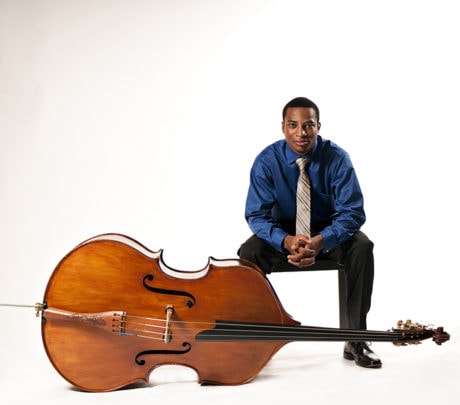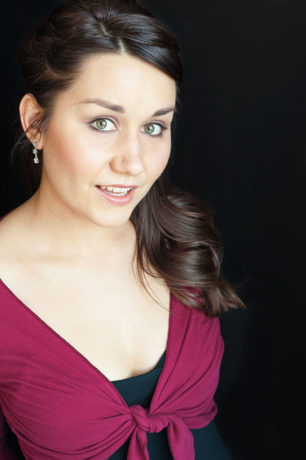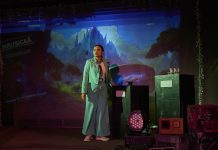LiveConnections Presents ended its sixth season with soprano Elizabeth Zharoff and double bassist Xavier Foley. This season was devoted to pairing musicians in order to stretch musical boundaries, and has resulted in some memorable programs, such as SYBARITE5 and Jakub Ciupinski, or Nicholas Photinos and Florent Ghys. Although both Zharoff and Foley are extraordinarily talented, the season finale fell short of the incredibly high bar set by the rest of the season. Still, the evening had some distinct treasures, and gave a glimpse of ways by which young, classically-trained musicians can connect their training to the contemporary world.

Both performers are Curtis graduates. In addition to her singing career, Ms. Zharoff is also a composer and sound designer for video games, with more than a dozen credits. The musicians’ Curtis connection and their shared love for video games formed the organizing principle for this collaboration.
The program opened with a performance by Fourte, the All-City Orchestra Quartet presented by Project 440, a gesture honoring LiveConnections’ commitment to music education in the schools. The quartet of musicians from Philadelphia public high schools performed a lively, if occasionally dissonant, movement from a Haydn string quartet.
Ms. Zharoff began by establishing both her vocal credentials and her sly subversive taste by singing two arias: Dvorák’s “Song to the Moon,” from Rusalka, and “Mercé, dilette amiche” from Verdi’s early I Vestri Siciliani. The singer introduced the two songs by explaining their content and context, characterizing their connection as “two very happy arias amidst violence in opera,” and sang them with nuance, beautiful coloring, and strong stage presence.

Mr. Foley followed with a jazz suite, “Skyline,” written by David Orr. (Both performers were accompanied with sensitivity and gusto by Michelle Cann on piano.) This piece showcases both performers. The first movement, “Apex,” is a dynamic conversation between the two instruments; the second, “Twilight,” is lyrical and longing (it had more of a 2 AM feeling than an early evening one); the final movement, “Dawning,” features a soaring piano line around which the bass dives and weaves. Foley has a rock star’s performance presence, his body intensely attuned to the music he’s playing, although his face remains deadpan throughout the performance; the dynamism comes from the shifting planes of his body and head in response to the music.
The first half ended with two short co-compositions by Zharoff and Foley, inspired by video games, featuring both of them along with Ms. Cann. “Excalibur” sounds like the theme song for an Arthurian legend, lovely if a bit generic and over-reliant on rhymes like “long” and “strong.” “Temple Run” is a crowd-pleasing novelty, based on what is apparently an insanely popular game for phones: in her introduction, Ms. Zharoff said the game has been downloaded by 13% of the US population and 20% of the population of Singapore. The piece was introduced with a short clip of the game for an audience that seemed devoid of devotees. In order to “musically reproduce” a game that uses only percussion and occasion sound effects, Ms. Zharoff divided the audience into three percussion sections, gave us “fire” and “ducking” sounds to add on cue, then brought audience members on stage to provide the “monkey” and “jumping” sound effects, with the warning that if we messed up, her character would “die,” and the piece would start again. The result was not “great music” by any definition, but great fun: I would imagine it was even more exciting for the dress rehearsal with a high school audience that is a commendable feature of every LiveConnections Presents concert. At times, with her combination of vocal talent, stage presence, wry humor, and obvious passion for connecting with her audience, Ms. Zharoff shows potential for becoming a millennial version of Victor Borge, which is high praise from this aging boomer.
The second half of the evening topped the first. Mr. Foley played selections from two pieces for Cello, one by J.S. Bach, one by Vivaldi, giving more demonstration of his virtuosity and sensitivity to his instrument. This was followed by selections from a project Ms. Zharoff, with support from the Curtis Institute, recently developed: Song Cycle: The History of Video Games, twenty-six songs for classically-trained voice and piano, tracing the development of video games with songs from Pong to the present. (A karaoke version of the album is also available for anyone who wants to sing along at home.) The five songs performed reflected their inspiration’s history by growing in complexity, both musically and lyrically, as we progressed from Pong to Journey.
Mr. Foley then returned to perform his composition “The Falling Seagull.” He explained that he wrote the piece, inspired by a Chinese folk song, because there was no repertoire of music for double bass inspired by Chinese music. “The Falling Seagull” is a gorgeous, sonically complex piece is a showstopper demonstrating Foley’s musicianship. His visceral approach to performing is accompanied here by the dazzling acrobatic skill of his fingers over the entire neck of his instrument: one of the high points of a strong season for LiveArts Connect.
The evening ended with another commissioned co-composition, “Requiem,” a short, sweet piece for the three musicians, followed by an intensely delivered performance of the Gershwins’ “Summertime.”
Running Time: approximately two hours, with an intermission.
Elizabeth Zharoff + Xavier Foley performed for one-night-only, on June 2, 2017, at World Cafe Live – 3025 Walnut Street, in Philadelphia, PA. For future LiveConnections Presents events, visit the concert schedule.




